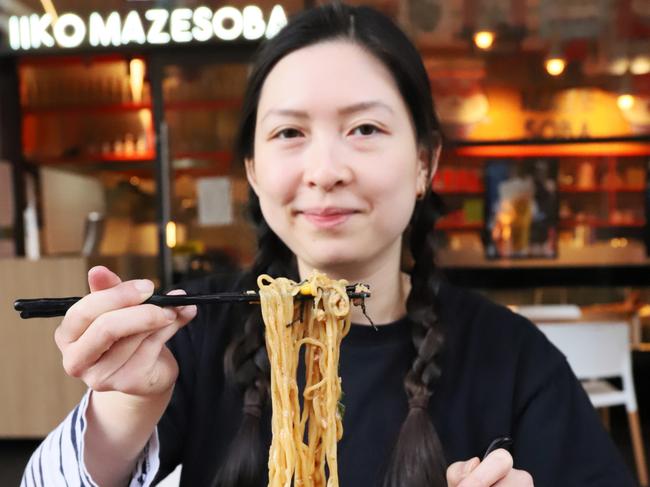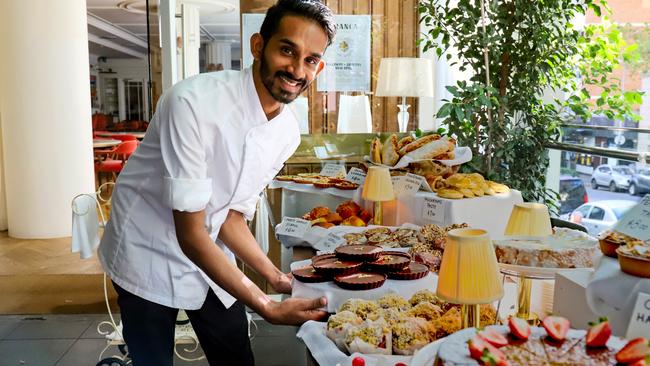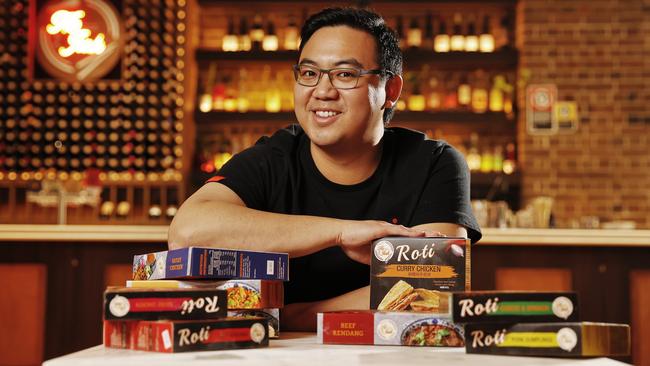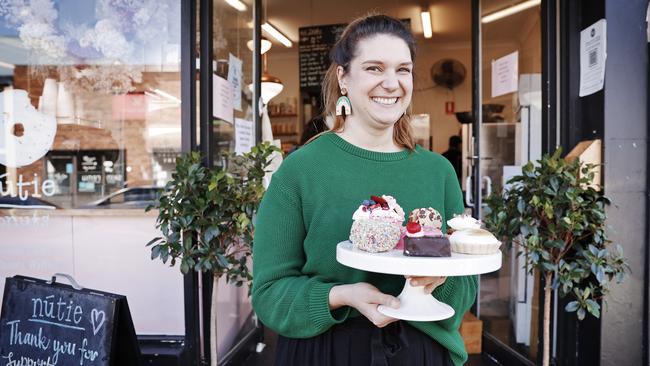Sydney Covid lockdown: 14 ways to support local food businesses
Supporting local when buying our food, is a positive step we can all take to help our hospitality industry. But it’s not as simple as ordering takeaway from your favourite cafe. Here’s how to help.
Eat Street
Don't miss out on the headlines from Eat Street. Followed categories will be added to My News.
With Australia’s already beleaguered hospitality industry struggling to stay afloat during another gruelling lockdown, thinking local when buying our food, is a positive step we can all take to help them stay afloat.
But it’s not as simple as ordering takeaway from your local eatery. Small interactions can have big consequences — both positive and negative — say operators. And it all starts with that caffeine hit before another day of working from home.
There’s a family behind every small business, so what you buy today can literally affect them that night.
Here are the 14 ways you can make a difference and support local businesses just by eating the food you love or giving yourself an excuse to try something new.
1. Think before clicking takeaway or delivery
The first thing to do is keep eating. Whether it’s a single pastry or a family feast, local businesses appreciate the support. By now, we all know that delivery services that come to your door take a pretty hefty slice out of the order but there’s more to the situation than dollars and cents.
“Not all places have the capability to do deliveries themselves, so even with that cut, it’s business they wouldn’t have had otherwise,” said Junda Khoo of Ho Jiak,
Michelle Widjaja of IIKO Mazesoba points out that “delivery services do take a cut, but if people minimise going out, it does reduce the chance of transmission, and we may be out of this quicker”.
“That being said, contactless pre-order pick-up is ideal if you live in the same area as your eatery of choice and are following lockdown rules.”

2. Order direct
When possible, order direct over the phone or on the eatery’s website as third-party ordering services take a cut. Pre-ordering saves time, limits loitering, and some places also offer kerbside pick-up on arrival.
3. Gift cards and vouchers
If possible, pick-up vouchers for pre-planned purchases. If you know you’ll be sculling coffee when you’re back in the office, buy a loyalty card, and consider buying gift certificates from those favourite restaurants you have on rotation for birthdays and special occasions. The cash flow it brings in helps businesses meet their immediate obligations, including rent and staff wages.
4. One for you, one for me
Gift someone a meal. Random acts of kindness have never been more necessary, and nothing says I love you like an order of chicken tikka masala and garlic naan or a frozen meal kit for future use.
5. A little something
Add something to your usual order, such as an entree, dessert or even an extra serve of rice. Every little bit counts. You can also include a bottle of wine or pre-mixed cocktails.
While online, peruse the business’s shop. Many places have their own line of condiments and other pantry items along with branded merchandise such as keep-cups, caps and T-shirts. Finances permitting, stash some things away for last-minute gifts, One can never have enough stubbie coolers and novelty socks. And if you’re still fit for photos, snap a pic and post it to the gram.
6. Stock up on staples
When lockdowns slam doors shut, many establishments sell off inventory rather than have it sit on the shelves. Boutique beers, wine and spirits are being sold at or below cost, so not only can you get a great deal, but you can also use this as an excuse to expand your horizons all while injecting cash back into the business.
Finances permitting, consider purchasing pantry items when you pick up your takeaway order. Rocco Calautti of Cucina Espresso in Concord notes that often places will have a table at the door displaying items available for purchase such as dry pasta, wine and housemade sauces.
7. Look out for surplus stock and daily specials
While some stock can wait it out, perishable items are on the clock. This is when chefs don their caps and get creative, making sure no morsel goes to waste. Pay particular attention to the specials’ board (or Facebook posts). Often, venues are able to buy seasonal produce and other ingredients in bulk. Once they get that assembly line going in the kitchen, next thing you know, they’ve got a fridge full of lasagne (the unofficial lockdown dish) ready for customers to take home, reheat and feed the whole family.
8. Find a bake sale
Brasserie Bread head pastry chef Travin de Hoedt, Franca Brasserie’s head pastry chef baked more than 600 sweet and savoury pastries for a bake sale to benefit staff. Keep an eye on Facebook for similar events, and if possible, share that information with others. Everyone loves a treat.

9. Shop at your local food markets
With restaurants closed, many farmers and growers now have a surplus of perishable stock, so rather than have it go to waste, they’re offloading it via very reasonably priced produce boxes. Hop online to find ones that can be delivered to your area, or better yet, pre-order for pick-up at a local market. Fans of fresh fruit, veg and other artisanal products will be glad to know that food markets, such as Carriageworks Farmers’ Market, are considered essential services. There’s no browsing, though, so you’ll need to go in with a list as a single-household shopper.
10. Be patient
It’s hard enough reconfiguring that unused closet into a home office, so just imagine having to reconfigure your software solutions to accommodate the modified ordering system, which is supposed to streamline logistics. And that’s just to put in an order for takeaway containers. So, yes, there are bound to be some mistakes and delays when ordering.
“Many new businesses are just starting out with delivery and pick-ups, so it definitely helps if customers are patient and understanding”, says Christopher Sheldrick of THICC Cookie.
And check for changed hours of operation before rocking up to place a takeaway order.
That being said, respect goes both ways.
“A lot of our customers are going through similar pain, so we need to make sure we understand that too”, says Anthony Bertoni of Bertoni Cafe in Balmain.
“We want to make sure we give our customers all the things they know and love, so they feel supported.”
11. Spread the word
The best way to help doesn’t cost you a thing, points out Michelle Widjaja of IIKO Mazesoba.
“Since disposable income isn’t readily available for a lot of us, just chucking a like or a follow or share on Insta is greatly appreciated and really helpful. In addition, liking and sharing posts will help the account grow in visibility by bringing it higher up on the feed.
“So, even though you might not make a purchase, someone else might just have a craving for it at that moment. Plus, with more visibility, that also saves money on advertising and promotions.”
To get a local favourite’s name out there, you just need to interact with their online profiles. Follow more of your favourite places. Like, share, tag, and comment on their posts.
And take up the Re-Plate Challenge (#replatechallenge) by replating takeaway like a proper meal rather than tucking straight into that takeaway container. Take a before and after photo, then post it on your own social feed.
12. Post positive reviews
You know that barista who always remembers your name and order, or the owner that brings out the crayons when you bring in the kids? Now is the time to tell the world about their stellar service. Write a nice review. Places with higher ratings show up higher in online searches.
And keep it positive. There’s already too much negativity out there right now.
If you do have a complaint, keep it off social media and contact the place directly. Odds are they may not even know about the problem and will take your observation as a form of constructive criticism.
13. Share the fun stuff
When you hear about something of interest, share it on your feed and local Facebook groups such as KEO (Keep Eateries Open) South West or Balmain Rozelle Dining. New Brittania Pub has something fun at the moment: bring a 1L water bottle and get it filled with beer for $1 or make it a 2L growler by bringing in a clear plastic milk jug.
14. We’re all in this together
Nothing better exemplifies that phrase than small local businesses. Specifically, those that support other small businesses. So, whenever possible, take a look around and see if they’re supporting local as well. Even when it comes to your milk.
“Try to go to coffee shops owned and run by locals that are using local milk and other products. And the same in the supermarkets. Look for the local milk that supports Aussie owned farms and processors,” said John Fairley, owner of Country Valley dairy.
“And of course, frequent markets safely to directly help farmers. If ever there is a time to do this, it is now.”
GOT A PROBLEM? PICK UP THE PHONE
You could call it bad luck or bad timing, but Junda Khoo, head chef and co-owner of the popular Ho Jiak Malaysian eateries, simply calls it the double whammy.
“We opened Ho Jiak Town Hall three days before the first lockdown, and then our newest restaurant, Amah, opened 13 days before the second lockdown,” he said.
Last year, he knew a lockdown was inevitable, so he secured financing in advance and closed to walk-ins.
“That’s when we started working hard on takeaways, frozen vacuum packs, microwave meals. Last time, it was more emotional for me, I had skilled visa workers who didn’t receive support, so it was up to me to make sure they had money to pay for food and rent. That’s how we came up with the $10 survival packages.”

Ho Jiak also worked with Thai Kee IGA in Haymarket on now a successful venture called Restaurant Range, a collaboration that continued over the past year.
“We worked on how to make restaurant food simple and easy to do at home,” said Khoo, who admits it’s not perfect.
“Yes, we make a nice piece of fish here it, but what happens when you try to reheat it again two hours later, it’s not the same. (But) it’s nobody’s fault.”
If customers are not happy he suggests they contact Ho Jiak directly rather than leave a negative review online.
“To be honest, that is constructive criticism to us,” he said, noting how such conversations have led to them rewriting instructions, modifying packaging, adjusting recipes and labelling ingredients.
“We just keep learning and improving,” he said.
THINK SMALL
Were it not for face masks and check-ins, you’d be hard-pressed to realise we’re living in dark times, what with the way Nutie Donuts co-owner Sina Klug cheerily waves to her neighbours and greets customers by name.
“We’re lucky to be in a hospitality business that gets to do something, unlike many night-time businesses or restaurants. We’re very grateful for that and the community support,” she said.
Klug knows it’s the people around her who have helped her gluten-free doughnut business grow from a market stall to a bakery in Balmain and a cafe in Surry Hills.
She’s been repaying that kindness and support ever since, particularly now during lockdown when so many of her suppliers and staff are facing logistical challenges of their own.
“We have longtime customers making deliveries, and our baristas are even helping chop vegetables in the kitchen,” she said.

Klug has always relied on small businesses for her supplies and when developing the menu for her Surry Hills cafe she also focused on supplies that come from small businesses.
“It’s just that little bit more of an alliance,” she said.
Klug started baking gluten-free and vegan treats not for herself but for two close friends, so it’s not surprising that she sees these treats as a way of “bringing joy”.
“Everyone is doing it tough at the moment. It’s like people just need a little bit of joy, and if that’s something we can deliver through food, then I feel like that is our responsibility at the moment,” she said.
And for those with allergies and intolerances who find it difficult to source their preferred brands when people start panic-buying at the supermarket, Klug offers a safe alternative.
“With gluten-free and vegan products you don’t have the option to get another bread as it’s the only bread you can get, so it makes it really hard for some people to have choices at the moment,” Klug said,
Nutie’s 2.5kg gluten-free lasagne ($45) is a particular win for families.
“We want to make it affordable for those families that don’t have an option, at the moment, we’re not trying to make a profit, we’re just trying to break even to pay our staff and provide savoury items that are really reasonably priced,” she said.
Nutie is currently offering takeaway and pre-order pick-up or check online for full details on delivery throughout the greater Sydney region.




